Football at the highest level is often about the tiniest details; it’s not the flashy skill that wins you games, let alone championships, but a small aspect of the game that’s been honed for years until it’s fully mastered.
Sometimes, players are so extremely good at one thing that it defines them.
Samuele Ricci from Torino, for example, is a player whose ability to retain the ball under pressure is starting to turn heads.
The Serie A midfielder is outstanding at an aspect of football many top teams deem invaluable.
This ability often breaks the game, from Manchester City, Arsenal, or Barcelona to the smaller teams that are under immense pressure week in and week out.
So, in this micro-tactical analysis, we’ll give you a scout report on Ricci to discover the secret behind his fantastic ability.
Note that the analysis will still be highly detailed and lengthy.
We’re calling it a microanalysis because it focuses on one aspect of Ricci’s game in Torino’s tactics rather than his full player profile.
Samuele Ricci Data Analysis
Samuele Ricci is a 23-year-old midfielder currently playing for Torino in Serie A.
Standing at 180cm (5’11”) and weighing 73kg (160lbs), he’s a player with a low centre of gravity and a compact build, enabling the sharp and quick turns that are essential to his ability to retain the ball under pressure.
Overall, however, Ricci’s profile will not always keep you on the edge of your seat if you look at it through a purely statistical lens.
Here, you can see a data analysis of his 2024/25 with a sample of 558 minutes played in Serie A so far.
We see a player excelling in one category while the others are not as highlighted yet.
Samuele Ricci Radar Map
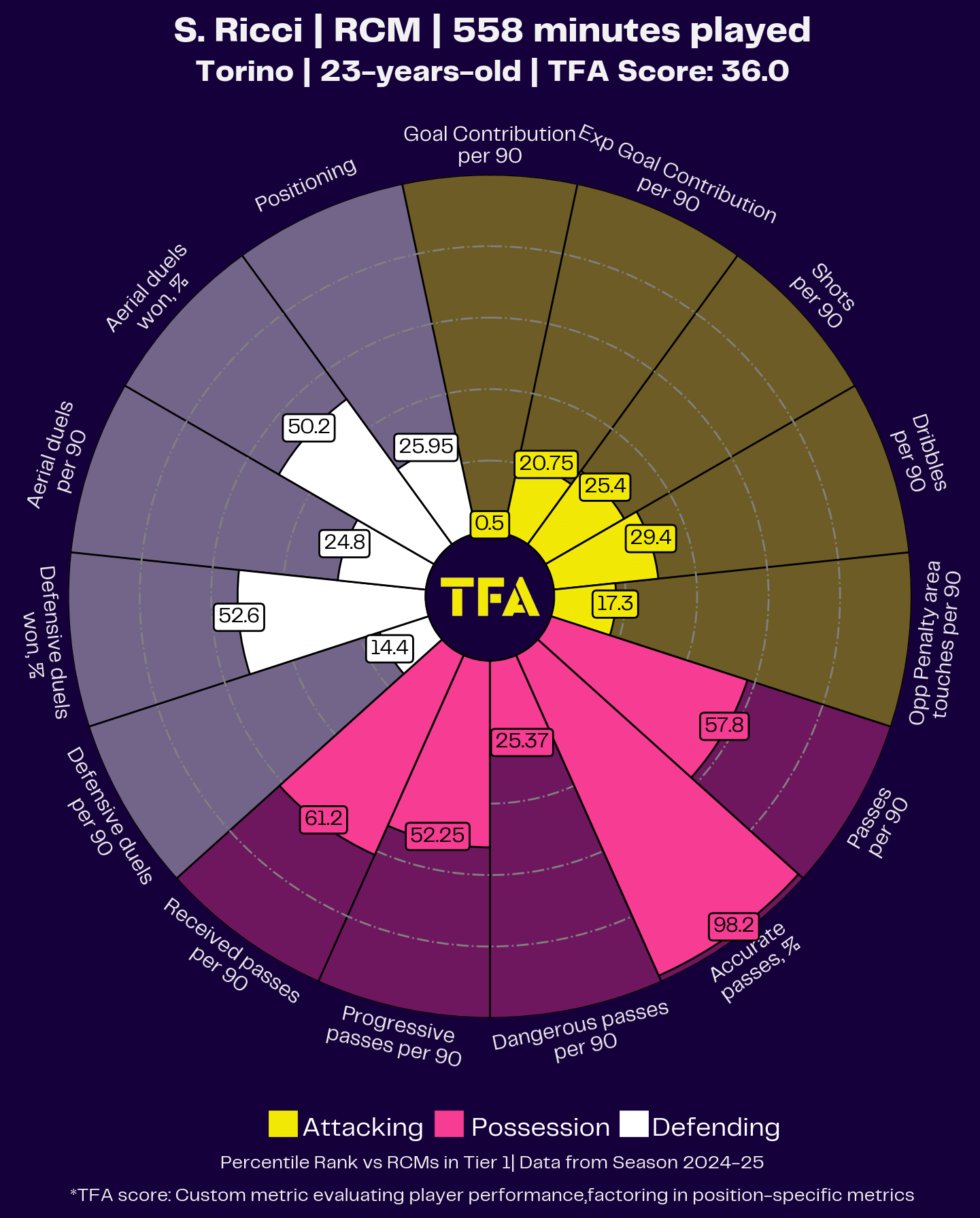
But even this data tells us exactly what we’ve alluded to earlier: Ricci is a stable player in possession, someone who rarely – if ever – loses the ball, even when under immense pressure.
His pass accuracy tells us that.
He may not be a big creator in possession, as evidenced by his low percentile rankings in attack and dangerous passing.
Still, his received passes, pass volume, and even progression put him above the average Tier 1 player in his position.
Probably the most important analysis, however, was done by CIES Football Observatory, which looked for ‘the midfielders with the best statistics for keeping the ball in high-pressure situations in 18 European top divisions, the Brasileirão and Mexico’s Liga MX’.
With 92.5% ball retention under pressure, Ricci came second only to Bayern Munich’s Joshua Kimmich, who retained the ball an incredible 95.8% of the time.
But how exactly does Ricci do what he does?
What’s the secret to his incredible ability?
Let’s dig a bit deeper in our tactical analysis.
Samuele Ricci Style Of Play
We’ll start our analysis with Ricci’s physical predispositions that greatly aid him in retaining the ball under pressure.
The 23-year-old’s frame is quite compact, and with the low centre of gravity, wiggling out of pressure comes more easily and more naturally to him than many other players.
Of course, this is far from the only attribute that makes him so good at this, but it’s still one of the defining ones.
Ricci can turn quickly and control the ball across different angles, even if he’s predominantly right-footed and uses his right foot much more than his left.
All of that makes for the first big element in his game and the first thing on our analysis list: Ricci is compact, agile, tricky, and highly technical, making him a great small-space dominator and a player who can thrive under direct pressure.
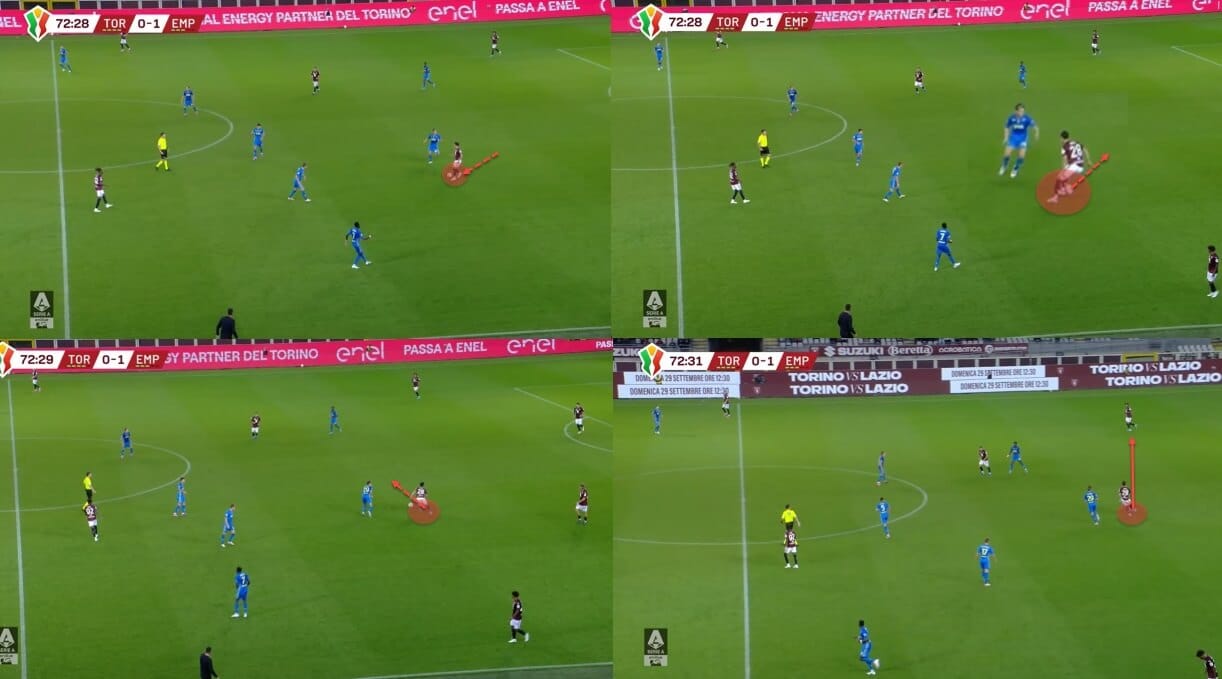
In this first example, you can actually see these attributes in action; Ricci is being pressed from the back, but he easily turns and starts his run against the direction of the press, essentially leaving his marker buried in his spot. In contrast, the 23-year-old continues his movement in the opposite direction.
It’s quite interesting to see how he takes multiple small touches when repositioning himself. That gives him more close control and ensures the ball stays glued to his foot.
But the second part of this seemingly simple sequence also tells us a lot about Ricci’s overall profile and how it aids him in these situations.
Instead of forcing verticality and progression, the young midfielder opts for a much more stable option and passes further back to one of his defenders to recycle possession.
This is important because Ricci is a safe option in possession.
This means he won’t risk his team unnecessarily trying a flashy pass or an overly vertical one.
The data analysis also confirms that, but we’ll discuss it further in this scout report.
Sticking to the physical attributes, despite being of relatively more diminutive stature or, rather, despite not being an imposing physical player, Ricci is quite adept at using his body as a tool and manipulating his frame to protect the ball.
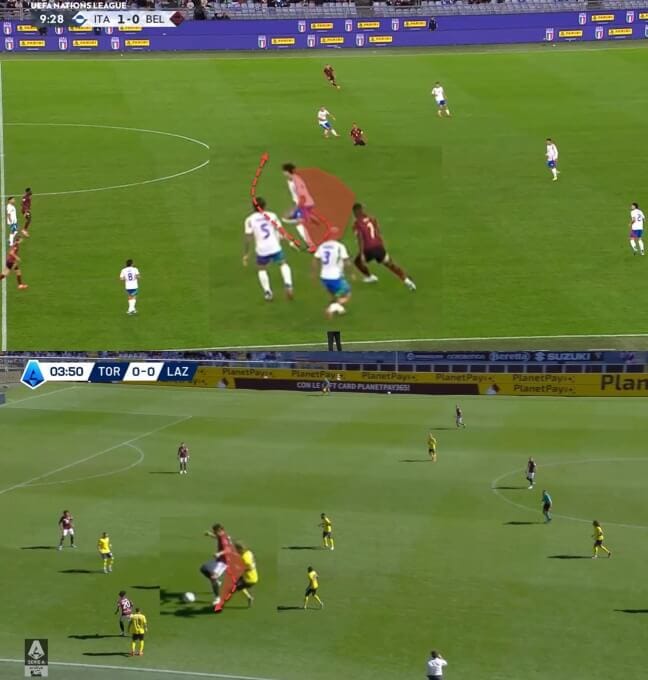
In this latest example, he’s very quick to literally jump in front of the ball to use his body as a shield or a barrier against the oncoming opposition player.
Sometimes, as in the bottom picture, this results in a collision and often a foul in favour of Ricci’s team.
However, sometimes, just by being there and closing all and any angles for the marker to tackle for the ball, the contact gets avoided altogether.
That’s precisely what happened in the top image in our example; Ricci simply takes a step in front of the marker and turns sharply, denying access to the ball and retaining it under what was likely to be great pressure otherwise.
Sometimes, the trick to resisting the pressure is stopping it from materialising in the first place.
That’s what the great players often do.
The final physical attribute we have to mention is the short burst.
Ricci is not a big-space player.
While he can still track back and use his body defensively and offensively, this means he won’t carry the ball over long distances and most likely won’t outrun his markers in a foot race.
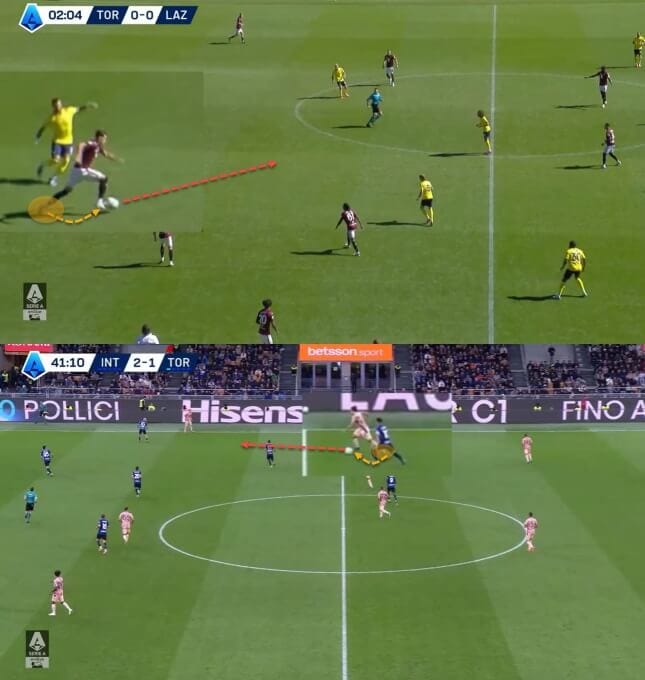
However, as can be seen here, he does have a short burst from a standstill that often gives him a step or two of advantage and is excellent at creating the initial separation from the marker.
And often, that’s all he needs to escape the pressure.
Ricci is somewhat inconsistent regarding the location of his received passes and his overall positioning.
His presence is crucial to Torino’s first-phase tactics, but he can also often be seen in the more advanced areas, especially the right half-space.
When he goes a bit further up the pitch, Ricci can use this press resistance to be an effective pocket player and even threaten the opposition’s goal directly from the areas between the lines.
Samuele Ricci Heat Map & Touch Map
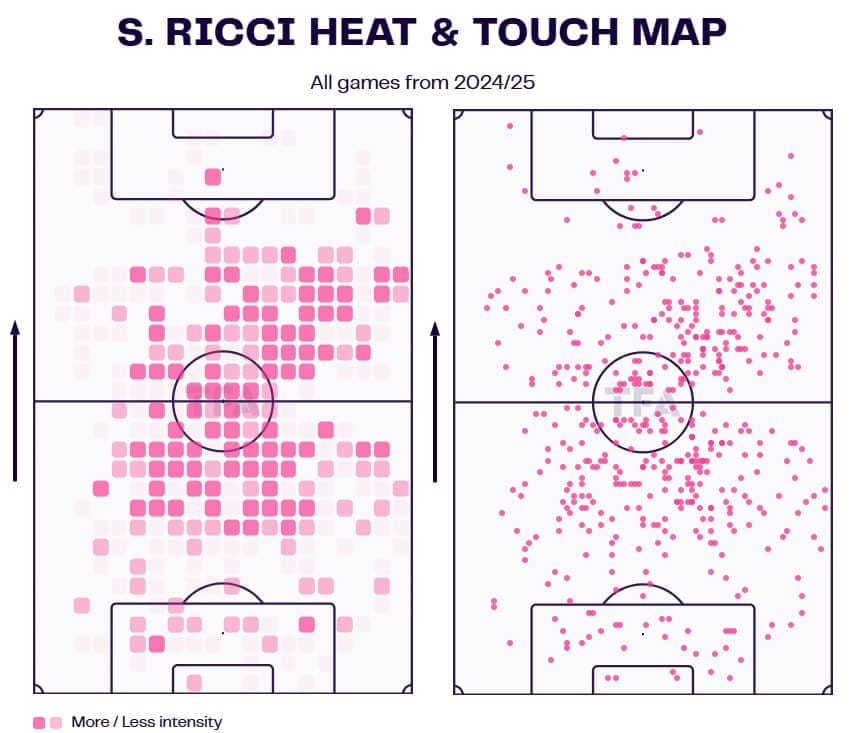
However, all of that is a great segue into the next section of our tactical analysis, which deals with everything Ricci does in possession of the ball.
Samuele Ricci Passing & Tactical Analysis
While the physical attributes are a core aspect of Ricci’s ball retention under pressure, his great technical quality, inventiveness, and security in passing cement this as an incredible tool in his player profile.
Statistically, it’s difficult for him to excel or challenge some of the top players in Serie A.
At the time of writing this tactical analysis, Torino is seventh in the league but is overachieving massively by winning 11 points when the advanced data analysis states they should only have around 6.9.
Still, they are a team that often splits possession almost evenly with the opposition (51.5%) and are around the league average in total pass volume, progression metrics, and passing rate.
However, in the last one, they trail the league average ever so slightly.
Similarly, one caveat to Ricci’s retention under pressure is that Torino are not often heavily pressed in Serie A (15.17 PPDA against), nor are they a highly aggressive pressing team themselves (16.57), meaning their games are not as fast-paced or chaotic that often.
With that out of the way, let’s take a deeper look at what makes Ricci so press-resistant in the first place.
First and foremost, it’s the absolute awareness of his surroundings, including his teammates, opposition and the space.
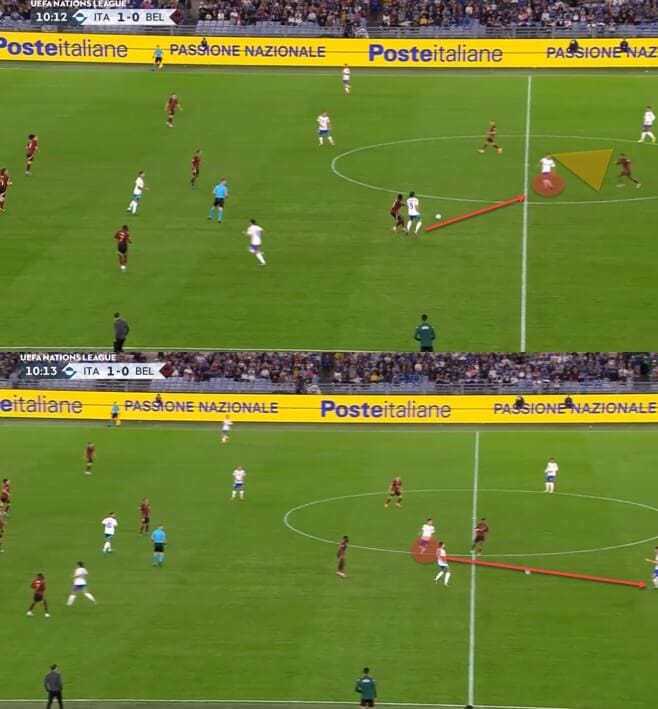
Ricci scans a lot.
And it’s precisely that tendency that prevents him from getting into sticky situations in the first place.
Again, as was the case in the previous section of our scout report, the 23-year-old is good at preventing himself from getting into scenarios from which there is no escape.
Instead, he does everything right beforehand to ensure that retaining the ball under immense pressure will be as easy as possible.
In our latest example, we can see him scan for potential passing options before receiving the ball from his teammate.
Having done so, he immediately plays a one-touch pass into an available target.
However, another thing to note is the location or, rather, the direction of that pass.
Earlier in our tactical analysis, we already discussed that Ricci is not necessarily a risk taker; he will be the stable part of Torino’s tactics and one that looks to be secure over being flashy.
This is often seen in the statistics as well.
Samuele Ricci Passing Map
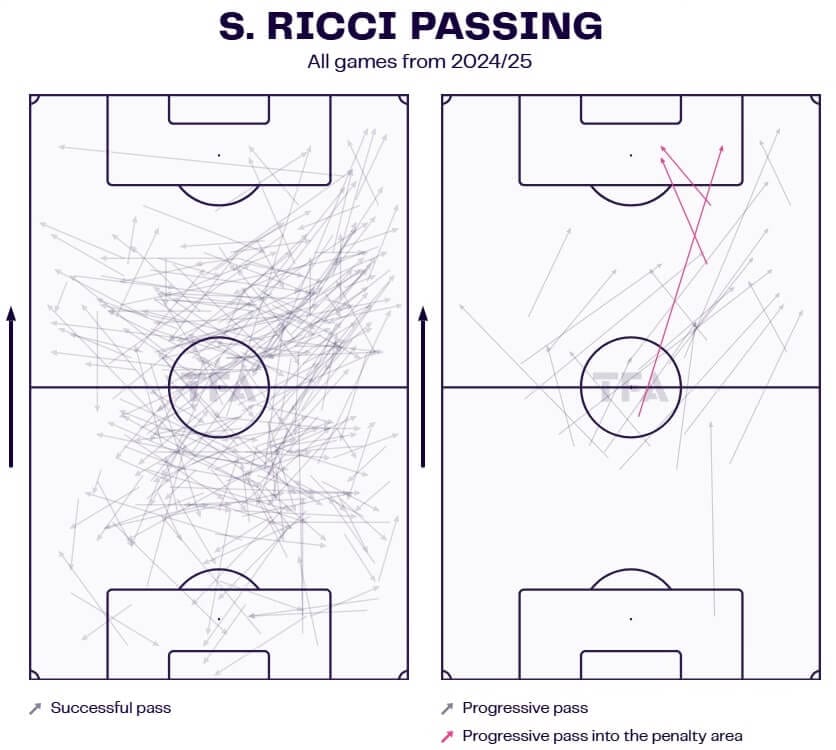
If we look at the data in these pass maps, we can see Ricci’s natural tendency is to recycle possession, and he will do so quite well.
A note that our data analysis was conducted across all Serie A central midfielders with over 500 minutes played this season.
Overall, he ranks 21st in received passes per 90 with 35.62 (1st has 69.62), 24th in passes per 90 with 44.87, and 12th in sheer accuracy with 91.05%.
This immediately tells us about his security in possession; even if Torino can’t match the pure volume in possession of some of the bigger Serie A teams, Ricci does extremely well when the ball is at his feet.
On the other hand, the progression numbers are quite low overall.
Ricci is not in the top 30 in forward passes, tallying only 10.56 per 90 with 76.86% accuracy.
Again, it’s a decent value, especially considering the accuracy, but the caveat of lower volume remains.
The same goes for progressive passes; he’s not a volume progressor as he doesn’t crack the top 30 in passes to the final third per 90 with his 6.02 or progressive passes per 90 with 4.02.
Ricci’s back passing and lateral passing, however, are once again as stable as it gets: eight in back passes accuracy with 98.65% but overall low volume again (6.46 per 90), 15th in lateral passes per 90 with 21.21, and 13th in success rate with 95.47%.
Similarly, all of his short and medium passes per 90 have an average accuracy of 93.63%, once again solidifying our thesis.
Samuele Ricci Ball Progression Map
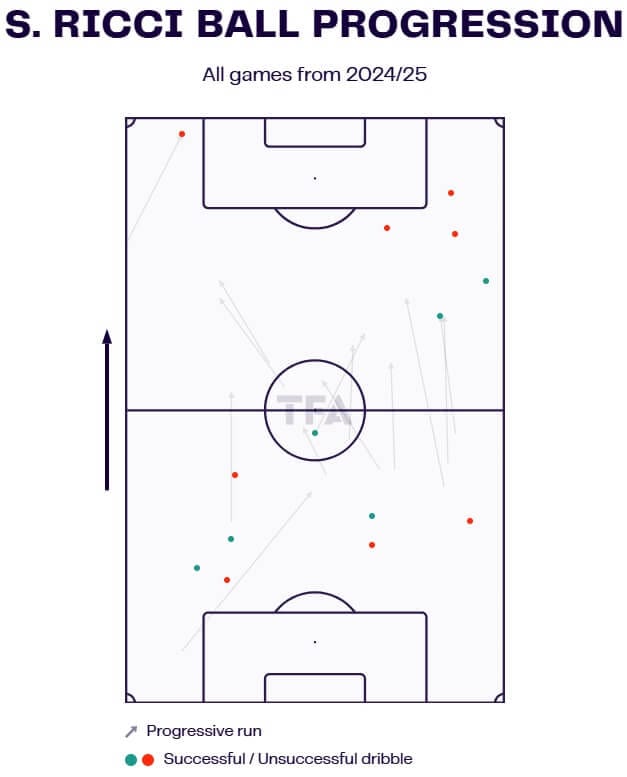
The same goes for dribbling as well.
But it’s interesting because we saw Ricci use his body composition and frame well when shaking off markers or preventing them from ever getting a chance to tackle him.
However, these things are often not found in the data, making any statistical analysis difficult.
That said, while his volume of dribbles is once again on the lower end (1.22 per 90, 42.86% success rate, doesn’t crack the top 30), it can still be effective.
He has a 57.38% success rate in offensive duels, good enough to be ranked fourth among all central midfielders in Serie A.
As alluded to earlier in our scout report, Ricci won’t carry the ball over long distances, so progressive running is not a huge tool in his repertoire.
However, the data suggests he’s still effective at winning duels.
The final aspect that greatly aids his retention under pressure, however, is the ability to invent passing lanes.
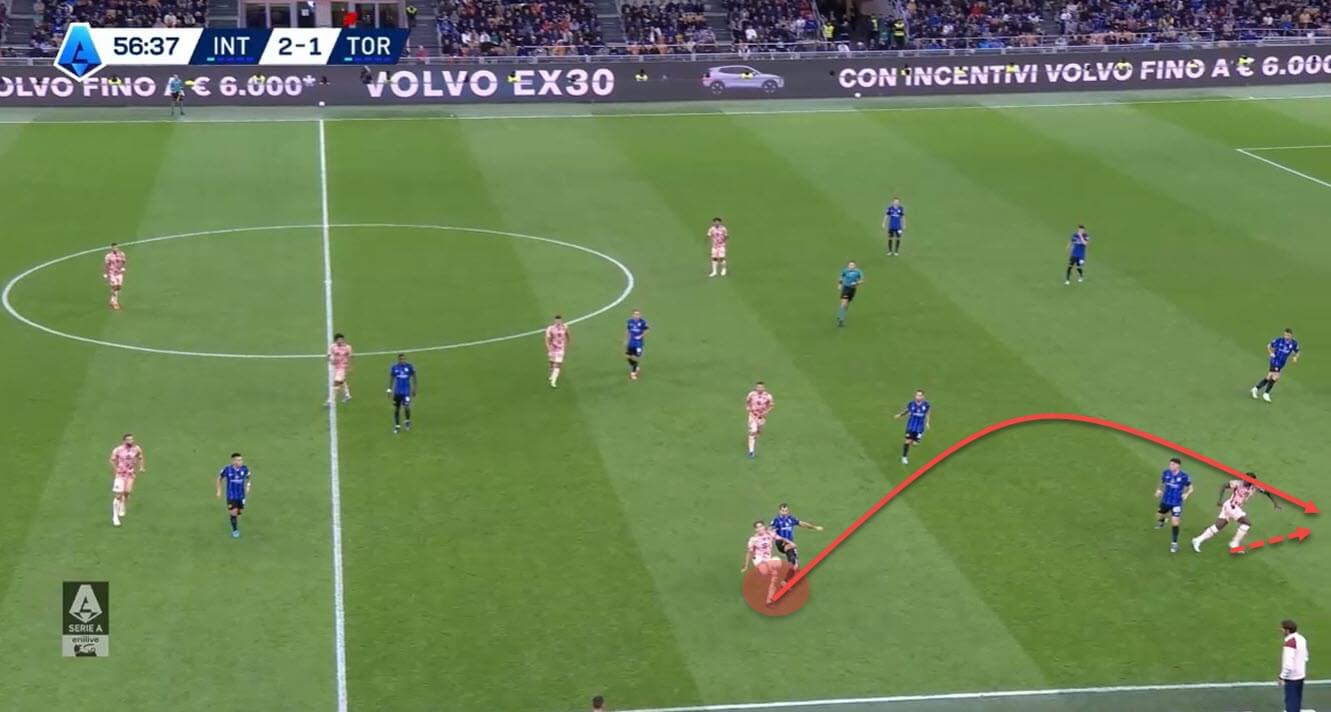
Take this sequence as an example.
Ricci is backed into a corner, but despite having a man on his back, he not only doesn’t lose possession but also manages to progress the ball safely and find a free man higher up the pitch.
This is exactly what sets him apart from many other players who often find themselves in such dire scenarios.
Conclusion
Samuele Ricci is a player who doesn’t always flood the headlines in the media.
And it’s no surprise either; he’s not flashy, eccentric or a player whose stats immediately catch the eye.
But everything about him, from his frame and how he uses it to his technical quality and intelligence, aids him greatly in being one of the most press-resistant players in the world.
Now the question remains: can he take this to the next level and sharpen the rest of his player profile to match this unique ability?
If so, many top teams might soon be knocking on Torino’s doors.

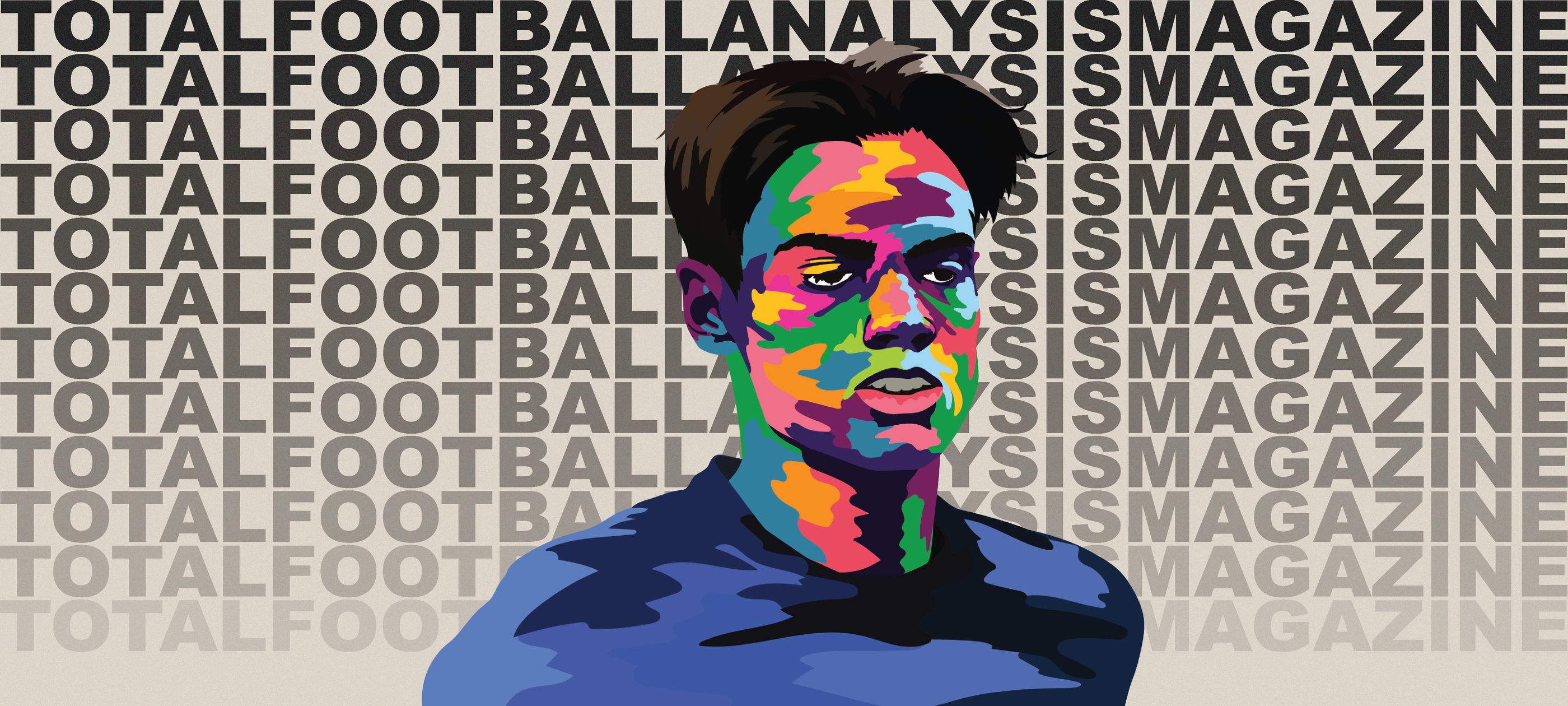




Comments